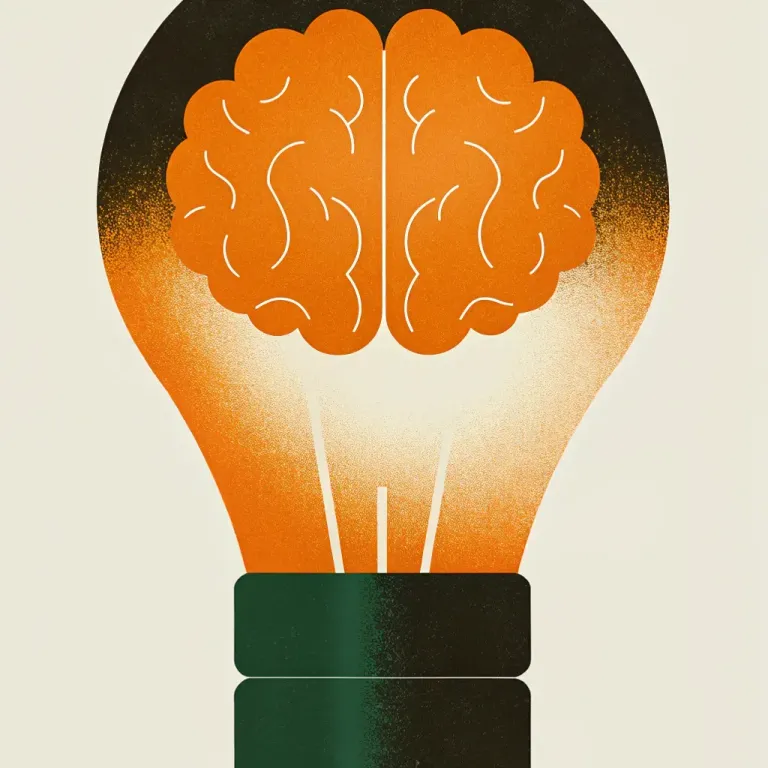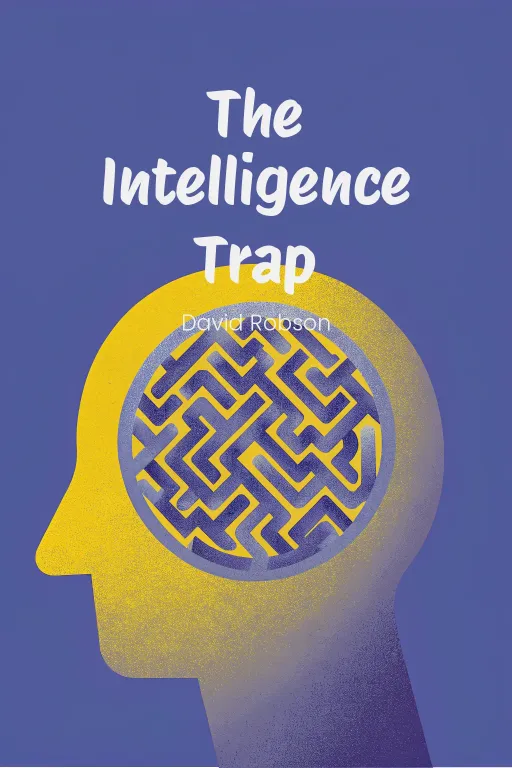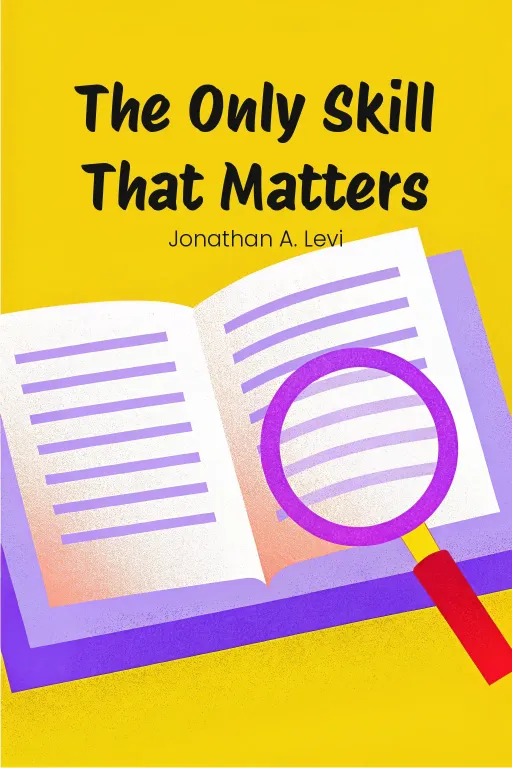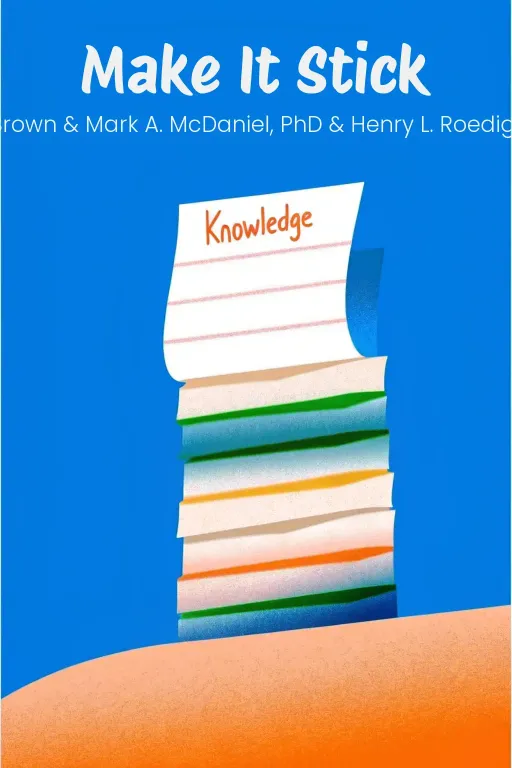
Hack Your Brain: Learn Smarter, Not Harder
Podcast by Beta You with Alex and Michelle
Hack Your Brain: Learn Smarter, Not Harder
Part 1
Alex: Hey everyone, welcome back! Today we're jumping into the world of learning, and how to do it “better". I mean, think about it – we're constantly trying to absorb info, right? Books, articles, new skills… Wouldn’t it be amazing if we could learn faster, retain more, and actually, you know, enjoy the process? Michelle: Exactly! But let's be real – how many times have we crammed for a test or binged YouTube tutorials, only to forget everything the next day? There has to be a more efficient way. Alex: That's where Jonathan Levi’s Become a SuperLearner comes in. It's basically a guide to upgrading your brain's learning capabilities. Levi mixes brain science, psychology, and proven methods like visualization, memory palaces, and spaced repetition, all designed to help you pick up new skills and knowledge faster, and with way less stress. Michelle: Okay, it sounds good, I'll give you that. But how much of this is actually backed by science, and how much is just… well, wishful thinking? Because there are so many courses selling those speedy learning skills. Alex: Fair point! So, in this episode, we're tackling three main takeaways. First, we’ll explore how motivation and neuroscience impact our learning. Then, we’ll dive into memory techniques that’ll help your brain work smarter, not harder. And finally, we’ll cover powerful tools for faster reading and connecting ideas across different disciplines. Think of it as building your own super-efficient knowledge network. Michelle: A knowledge network, huh? Sounds like rush hour in my brain! But alright, I'm intrigued. Let's see if this SuperLearner thing lives up to the hype.
Foundations of Effective Learning
Part 2
Alex: Okay, Michelle, so last time we talked about memory palaces and spaced repetition—really focusing on the "how." But before we dive deeper into techniques, we need to nail the big “why” and "what," right? Why is learning so crucial today, especially in this amped-up way, and what really sets the stage for mastering anything? That’s where the fundamentals of effective learning come into play. Michelle: Yeah, that makes total sense. But first, the "why"—because, let’s be honest, people have been learning stuff for, like, ages using the usual methods. So, what's actually changed? Why do we need to rethink the whole approach? Alex: The whole landscape has shifted, Michelle. We're swimming in information overload. I mean, every single day we're bombarded with data from the news, social media, our inboxes, and even online courses. And with jobs evolving on the fly, adapting to these industry shifts, your ability to learn quickly is basically a survival skill. Levi calls it, “the only skill that matters.” Michelle: Okay, fair point. But speed isn’t everything—you also need to get it right. It’s one thing to be able to sift through tons of data, but how do make sure the important stuff sticks long enough to really use it? If I'm reading articles or taking a class, I want to know it's worth my time, you know? Alex: Absolutely. And Levi makes it clear that learning should be intentional, it shouldn’t be passive. You need two key things: real motivation and preparation—both mind and body. Michelle: Right, intrinsic motivation. So basically, why you're even bothering to learn this, to begin with. I’m guessing "because I need to pass this exam" isn’t exactly cutting it, right? Alex: Not really. Things like grades or a job requirement, they might work in the short term. But deep down, people learn best when they are truly interested, or when they have a personal connection to the topic. Say someone who wants to connect with his family might be successful in learning a new language, rather than someone told by his boss for work. Michelle: That’s hilarious, because every time I tried to learn German? Epic fail. But then I planned a trip to Germany, and suddenly, I needed to order schnitzel in German, you know? And bam, it just stuck. Is that kind of the situation Levi is talking about—you do something with a personal reason? Alex: Exactly. That’s intrinsic motivation in action—it fuels persistence and curiosity. But hey, motivation’s just part of the equation, right? Being ready to learn is just as important, with sleep playing a huge role. Memory consolidation is critical to ensuring you can learn, but without sleep, you might as well be pouring water into a strainer. Michelle: Alright, I get it, sleep is essential and it is non-negotiable. But Levi talks about mental prep, too, right? What else can we do besides just getting enough sleep to put the odds in our favor? Alex: A productive environment is important. The brains thrive with focus, so you need to get rid of the distractions. A quick meditation or just pausing to reorganize makes your brain ready to collect information. You can think of it like prepping the soil before you plant some seeds. Michelle: I like that analogy. Speaking of getting ready, Levi wasn’t always a genius, was he? His journey from class clown to who he is today… That’s an awesome example of getting the motivation and the preparation right. Alex: Yeah. Levi had a tough time in school growing up, and felt like he was always falling behind, not good enough... But he had some sort of inspiration when he was in middle school where he was in control. To improve, he adopted new approaches to learning and careful preparation, he totally changed his academic career. This shows if you are prepared, anyone can level up. Michelle: Okay, so we get the mental and physical prep, but what about older people? Learning methods just can't be one-size-fits-all, because I would imagine old people's minds are wired a little differently compared to kids? Alex: You nailed it. That’s why Levi uses Malcolm Knowles’ ideas about how adults learn. Basically, adults are less interested in theory and more interested in learning the kind of practical, hands-on skills they need to solve problems. We learn best when it connects to our goals in the real world. Michelle: That makes sense—practice beats study any day. Like how a nurse learns how to treat patients, or someone in Tech who just wants to upgrade themselves. So, that kind of stuff keeps adults interested then, right? Alex: Definitely, and it's also about being able to direct yourself. Adults want to see how what they’re learning will help them right away. They also want to decide how they learn—choosing what works best for them. Michelle: That's different from sitting though some lecture where someone just drones on about code syntax without helping me debug software. Alex: Exactly. Levi talks about how Dwight, an Air Force pilot, used the idea of self-directed learning really well. He used clever memory tricks to arrange his study materials around exactly what he needed for his job. This gave him extra mental space. It also really locked in the technical stuff he needed to know. Michelle: Alright, so Dwight’s onto something. But how does someone even start doing all this? It kind of seems like there’s a huge gap between what we're learning and figuring out how to make it useful for what we want. Alex: That's where cognitive engagement comes in, tied to our sensory-based evolutionary strengths. This is fascinating—our brains evolved to rely on sensory-based learning, like visuals, sounds, and tactile feedback, because that’s how our ancestors interacted with the world. Michelle: So, the way people learn today—rote study from books or scrolling articles—is kind of disconnected from how we’re biologically wired to process information? Alex: Precisely. Strategies like visualization work well. Last time we touched on the Memory Palace technique, right? That taps into our spatial memory--a deeply ingrained evolutionary skill--and also is how we store and recall data that our brains naturally favor. Education systems just like Montessori emphasize hands-on, experiential activities that follow this principle. Michelle: Right, teaching math with colored beads instead of equations on some chalkboard - giving the students something real when ideas are hard to understand. Alex: Exactly! Vivid engagement with senses will help you have a stronger memory. The education we have inherited unfortunately misses the mark. They depend on memorization, which do not engage the learner. Michelle: Let me guess—they overload students with abstract concepts but skip incorporating tools that actually stick, right?
Memory Enhancement Techniques
Part 3
Alex: Exactly , and that’s where Levi’s methods come in, especially the memory enhancement techniques like the Memory Palace. Once we've laid this foundation, we can naturally move on to the tools that “really” boost retention. This part is all about taking theory and putting it into practice , giving listeners some real methods to fight information overload and, you know, general forgetfulness. Michelle: Alright, Alex, I’m ready. Let’s dive into these tools. Starting with the Memory Palace—I remember you briefly mentioning anchoring facts in familiar spaces. But what does that actually look like? Alex: Good question! The Memory Palace is basically taking a space you know super well—your house, your office, your walking route—and turning those locations into "storage units" for your memories. Let’s say you’re trying to remember a shopping list. You kind of mentally walk through your house, placing each item in a specific spot. So, the living room couch might have a giant bottle of ketchup on it, and the dining table could have a huge loaf of bread. When you need the list, you just mentally walk back through the space, "seeing" the items in each location. Michelle: Okay, that makes sense so far, but let's be honest, that sounds a bit… abstract, doesn’t it? I'm not sure I'd actually remember where I mentally hid the bread in my house. Alex: I get it. The key is to make those mental images as absurd or as vivid as possible. Our brains prioritize strange, unusual things over the everyday stuff. For example, instead of just "bread," picture an enormous loaf of bread dancing on your dining table, spinning like a ballerina. Weird, right? But that’s exactly what makes it memorable. Michelle: So, our brains love a bit of surreal theater. Good to know. But do people actually use this for serious information—not just grocery lists? Alex: Absolutely. Medical students, for example, use Memory Palaces to memorize anatomical structures. Imagine someone visualizing their home's bathroom covered in a mural of nerves to remember cranial nerve pathways. Each nerve is tied to a unique object or action in the room. By mentally walking through it, they can recall nerve functions perfectly. Neuroscience backs this up, because linking info to familiar spaces reinforces memory pathways. Michelle: Alright, I’ll give you that, it sounds like it could actually work. So, what’s the next step? Even with mental bread and ketchup, doesn’t it all fade if you don’t review it? Alex: Exactly, Michelle, and that’s where spaced repetition comes in. It’s about reinforcing material at specific intervals—right before you’d typically forget it. Hermann Ebbinghaus's research showed that without review, we lose most new information within days. But if we strategically revisit it, like on Day 1, Day 3, Day 7, and so on, the forgetting curve flattens out, and the memory sticks. Michelle: So this works by, essentially, poking your brain at just the right time? A reminder that says, "Hey, don’t forget this!" Alex: Precisely! It’s all about the timing. Tools like Anki or the Leitner system automate the process. Anki, for example, tracks which flashcards you struggle with and schedules them for more frequent review, while the easier ones show up less often. The more you recall correctly, the more spaced out the intervals become. Michelle: That sounds efficient, but it also sounds like something people might struggle to keep up with. I mean, tracking flashcards requires some discipline. Any hacks for lazy learners? Alex: Well, that's where digital apps “really” come in handy. They’re like having a personal memory coach reminding you at the best times. But even if apps aren’t your thing, physical flashcards in a Leitner box system work just as well. Put the cards you struggle with in the front for daily review, while the mastered ones move further back for less frequent rotations. Michelle: So, it’s basically like training for a memory marathon—incremental progress, with tools that keep you consistent. I’ll admit, that’s pretty clever. What about when the information you’re tackling gets, well, complicated? Like memorizing a series of obscure historical treaties or chemical formulas? Alex: That’s where advanced mnemonics step up. These go beyond just basic acronym tricks to include chunking, storytelling, or even creating absurd associations. Chunking is great for numbers—say you have a string like 149218451945. Instead of random digits, chunk them into 1492, 1845, and 1945—historical markers that already have meaning. Michelle: Ah, let me guess—Columbus in 1492, probably something about annexations in 1845, and the end of World War II for the last one. So you’re layering new info onto what you already know. Alex: Exactly! And stories? They’re game-changers. Let’s say a chemistry student needs to memorize the reactivity series of metals. They might create a bizarre tale of a king losing his golden crown, with each part of the story symbolizing a different metal. Our brains are hardwired to latch onto stories—because that's how humans have shared information for millennia. Michelle: So we’re all just cavemen around the campfire—except the “fires” are now spaced repetition apps and mental castles for bread. Alex: Pretty much! But it’s not just cavemen instincts; this is backed by neuroscience. Vivid stories, sensory details, and strange associations activate multiple brain regions, reinforcing the information. Basically, these advanced techniques layer logic and narrative for rock-solid recall. Michelle: Okay, but let me push back for a second—aren’t these methods time-consuming? Between memory palaces and spaced repetition, how realistic is this for someone juggling work, kids, you know, the daily madness? Alex: That’s a fair point. Like anything worth doing, these methods require some upfront effort. But once you train your brain to build connections faster, the long-term payoff is huge. Levi emphasizes that it’s not just about memorizing, but about retraining your cognitive habits so retention becomes second nature. Michelle: I guess that beats the alternative of cramming and forgetting everything in the morning. Alright, I’ll bite—how would you suggest people start without feeling overwhelmed? Alex: Start small. Pick one technique, maybe spaced repetition using a tool like Anki, and practice it with something manageable, like learning ten new vocabulary words a week. Or try visualizing a Memory Palace for a short list. Once you see results, it’s easier to scale up. Michelle: That’s not too intimidating. And hey, if it saves me from any last-minute cram sessions, I’d call that a win. Alright, what’s next in this brain-enhancement bootcamp you’re leading us through?
Speed Reading & Knowledge Integration
Part 4
Alex: Okay, Michelle, so after diving into retention strategies, let's switch gears. Next up is learning how to process info “really” fast without losing what it means. Jonathan Levi gets into the nitty-gritty of speed reading and how it connects to pulling knowledge together. Michelle: Processing information faster while actually understanding it? Alright, you've got my attention. But speed reading... I've gotta admit, all I picture are cheesy ads guaranteeing I'll be able to plow through "War and Peace" by lunchtime. Alex: I hear you – speed reading gets a bad rap. But when it's done right, it's not about skipping words or missing the point. Levi hones in on the three big roadblocks in how we usually read: subvocalization, fixation, and jumpy eye movements. These are the things that slow us down. Michelle: Subvocalization... the voice in my head that pronounces every word, as if I am making a personal audiobook? Yep, guilty! Alex: Exactly! And while that little voice might seem helpful to start, it caps your reading speed at how fast you can talk - around 300 to 400 words per minute. If you train yourself to just 'see' the words with your eyes and process them like visual cues instead of "sounding" them out, you totally bypass that bottleneck. Michelle: Right, but how do I just turn off the inner narrator? That seems automatic, like breathing! Alex: It takes work, for sure. Levi suggests consciously pushing your eyes to take in multiple words or whole phrases at once. Treat that group of words almost like pictures instead of trying to pronounce them. Another trick is using a pointer, like a pen or your finger, to smoothly guide your eyes across the page. Humming lightly or tapping can also distract the brain enough to quiet that inner voice. Michelle: Hmm, okay, sounds like a mix of science and mind tricks. Using a pointer–does that help keep your eyes from jumping around so much, too? Alex: Absolutely! Those erratic eye movements, or saccades, waste tons of time as your eyes dart around the page without really absorbing anything. When you guide your eyes with something solid, like a pen, it creates a smoother path to follow, which cuts down on the unnecessary jumps. Michelle: Then there's fixation – pausing too long on each word we read. I'm betting the goal is to train the eyes to take in more during each pause, right? Alex: Precisely! Most people pause their eyes eight or more times each line, because they're looking at individual words. Skilled speed readers train their eyes to grab clusters of words or even whole phrases at once. It is the same difference between crawling in traffic on a city street, versus flying down the highway with very little stops. Michelle: Okay, I can see the potential here, with enough practice. That being said, how realistic is it to remember things when reading at warp speed? I mean, great if I can blast through emails faster but what happens when I'm studying something dense, like a research paper or a legal document? Alex: That's a great point. Levi is quick to say that speed reading isn't about blowing through every last word. It's about adapting your tempo to the material. If the content is light, fly through it. If it's thicker, slow down enough to actually engage with it and understand. He stresses that figuring out what you're reading is always priority number one, even if you're reading faster. Michelle: That makes sense – you're not just turning pages like a robot. But seriously, even if I could learn to read twice as fast, it doesn't solve the problem when information is coming at me from all angles. How do we find the stuff that actually matters? Alex: That's where he gives us the SQ3R trick: Survey, Question, Read, Recall, Review. It's a game plan for reading that preps you to grab the meaty stuff while skipping the filler. Michelle: Alright, run me through the details. Survey–what does that actually mean besides just skimming the page? Alex: Skimming smartly! Surveying means checking out the structure of what you're about to read before you actually read it. Quickly check out any titles, headings, bolded terms, diagrams... get a sense of the playing field. Think of scouting out a route before hitting the road. Michelle: So instead of wandering aimlessly through a complicated text, you've got a rough idea of where you want to go. And then... Question. What's that all about? Alex: Asking questions about the material before you read gets that curiosity engine revving. Say you're reading an article about going green. You might ask yourself, "What are the most creative solutions I have not heard of?" or "How are governments dealing with this?". When you've got those questions in your head, you go from just reading to searching. Michelle: Okay, and then we get to the "read" part where, let's be honest, many of us have spent most of our lives just slugging our way through pages. Alex: Exactly, but done right, reading turns into a hunt for those answers you're seeking. You're not absorbing every single word. You are reading with purpose and focus. That makes what you read stick better, simply because you've already fired up the engines in your brain. Michelle: Got it. Then we've got "recall", which looks like "memory gym" time. Alex: Bingo! Right after you read something, you pause, summarize, and explain what you just learned in your own words. That helps lock it in and shows you if you missed anything. Finally, the "review" step is all about revisiting the material regularly to help cement it in your memory for good. Michelle: So the SQ3R method flips reading into a dialogue instead of a lecture - sounds like it could be a game-changer for textbooks or research papers. Alex: Absolutely! Add that to the eye-movement tricks, and you're tackling both speed and understanding. But Levi takes it even further... reading skills by themselves aren't enough. Real mastery means connecting what you learn across different areas. Michelle: Integration – as in, spotting connections between ideas that might not seem related at first? Alex: Exactly. Levi calls it "cross-pollination," blending understandings from different fields to spark new ideas. What about Steve Jobs, who took the teachings of calligraphy to revolutionize Apple's fonts and typography? Or scientists solving issues by blending physics and biology? Magic happens when you smash ideas together. Michelle: Okay, fair point. Cross-pollination makes sense for sparking creativity. But how does "brute force" apply here? Alex: Brute force learning is its companion. Rather than a linear route, imagine a tree with many branches that can be investigated. Learning a language might involve podcasts, children's books, apps, and casual conversations. A student of leadership might read communications theory, history, and even watch documentaries to broaden their understanding. Michelle: Right, instead of one narrow path, you're taking this messy, scenic route that just happens to let you see more of the view. Alex: Exactly! Toss in passion and curiosity on top, and you have the perfect recipe for deep, integrative learning. Either you're innovating at work or just making your life richer. Michelle: Alright, Alex, I buy it. Speed reading and merging knowledge won't turn me into a genius overnight, but I'm sold on the science. Now, let's see if my brain's ready for this high-speed information highway.
Conclusion
Part 5
Alex: So, to bring it all together, we’ve really dug into the core principles of effective learning, explored those cool memory techniques like the Memory Palace and spaced repetition, and even looked at ways to process information more efficiently with speed reading and SQ3R. We've also touched on cross-pollination and that idea of brute force learning, showing how true mastery “really” comes from connecting ideas from different fields. Michelle: Exactly, and I think the key takeaway here is that, learning isn't just about cramming everything in, right? It's “really” about understanding how your brain works best and using that to your advantage. Whether you're turning your bedroom, or your living room into a mental filing cabinet or using apps to optimize your review schedule, it's about finding the tools that make learning a sustainable part of your life, and not just something that burns you out. Alex: Precisely! And if our listeners remember one thing, let it be that continuous learning in today’s fast-paced world is truly a superpower. Whether you experiment with speed reading, build a Memory Palace for important details, or venture into cross-disciplinary learning, the trick is to begin with small steps and maintain consistency. Michelle: Start small, I like that. So, if a Memory Palace can actually help me remember my grocery list, I’m counting it as a major victory. Alex: A major victory indeed! So, here’s a challenge for our listeners: choose just one strategy: the Memory Palace, spaced repetition, or the SQ3R method—and commit to trying it out this week. Let us know how you get on. Remember, the journey of learning is the real superpower here. Michelle: Absolutely, and with that said, keep sharpening that mind, folks. Until our next conversation, we'll catch you on the other side of the knowledge highway. Alex: Stay curious, everyone!









